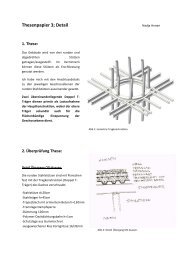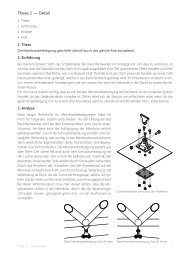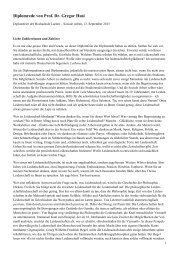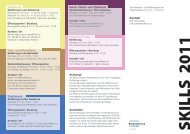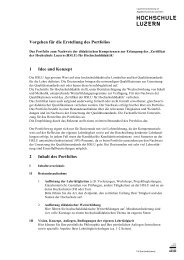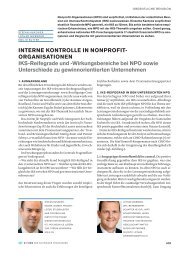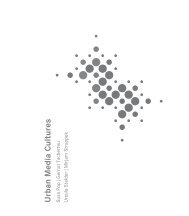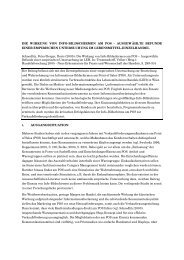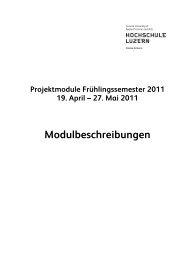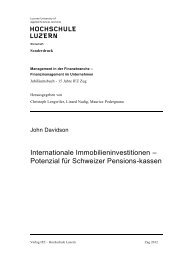Designwissenschaft und Designforschung: Ein einführender Überblick
Designwissenschaft und Designforschung: Ein einführender Überblick
Designwissenschaft und Designforschung: Ein einführender Überblick
Erfolgreiche ePaper selbst erstellen
Machen Sie aus Ihren PDF Publikationen ein blätterbares Flipbook mit unserer einzigartigen Google optimierten e-Paper Software.
Issues � <strong>Designforschung</strong> � <strong>Designforschung</strong> <strong>und</strong> Designpraxis<br />
actions. […] Here the exchange between research and<br />
practice is immediate, and reflection-in-action is its<br />
own implementation.»<br />
(Schön, 1983, pp. 308-309)<br />
Gray <strong>und</strong> Malins konstruieren daraus die Rolle des «practitioner-researcher»,<br />
die sie unwiderstehlich finden:<br />
«Your «insider-knowledge», experience and status usually<br />
lends your research credibility and trustworthiness<br />
in the eyes of your peers, that is, you are not an «external»<br />
researcher. Most importantly, you are inquiring as<br />
a reflective practitioner, acknowledging the complexity,<br />
dynamism and unpredictability of the real world.»<br />
(Gray & Malins, 2004, p. 3)<br />
Ad 3:<br />
Implizites Erfahrungswissen: Polanyi (1966)<br />
Polanyi (1966) thematisiert die Rolle von implizitem Erfahrungswissen<br />
(tacit knowledge), wie es dem Praktiker eigen<br />
sei. (� Wissen <strong>und</strong> Wissensbegriffe) (� <strong>Ein</strong>führung in die<br />
<strong>Designforschung</strong>)<br />
«I shall consider human knowledge by starting from the<br />
fact that we can know more than we can tell. This fact<br />
seems obvious enough; but it is not easy to say exactly<br />
what it means.»<br />
(Polanyi, 1966, p. 4)<br />
Er zeigt ausserdem auf, dass tacites Wissen – also Traditionen,<br />
übernommene Praktiken, implizierte Werte, <strong>und</strong><br />
Vorurteile – verkörpert ist.<br />
«This brings us to the point at which I hinted when<br />
I first mentioned perception as an instance of tacit<br />
knowing. I said that by elucidating the way our bodily<br />
processes participate in our perceptions we will throw<br />
light on the bodily roots of all thought, inlcuding man’s<br />
highest creative powers. Let me show this now.<br />
Our body is the ultimate instrument of all our external<br />
knowledge, whether intellectual or practical. In all our<br />
waking moments we are relying on our awareness of<br />
contacts of our body with things outside for attending<br />
to these things. Our own body is the only thing in the<br />
48<br />
world which we normally never experience as an object,<br />
but experience always in terms of the world to which<br />
we are attending from our body.»<br />
(Polanyi, 1966, p. 15-16)<br />
Polanyi argumentiert, dass tacites Wissen ein kritischer<br />
Bestandteil wissenschaftlichen Wissens sei. Die zwei Aspekte<br />
von Wissen, «wissen» <strong>und</strong> «können», oder «knowing<br />
what» <strong>und</strong> «knowing how» seien untrennbar miteinander<br />
verb<strong>und</strong>en.<br />
«These two aspects of knowing have a similar structure<br />
and neither is ever present without the other. This is<br />
particularly clear in the art of diagnosing, which intimately<br />
combines skillful testing with expert observation.<br />
I shall always speak of «knowing», therefore, to<br />
cover both practical and theoretical knowledge.»<br />
(Polanyi, 1966, p. 7)<br />
Er zeigt, dass Teile von tacitem Wissen zusammengebracht<br />
werden können, um Theorien oder Modelle zu schaffen.<br />
Dies könne durch geschicktes Herauslocken (elicitation)<br />
geschehen, so dass dieses Wissen explizit geteilt werden<br />
kann. Tacites Wissen sei notwendig beim Versuch, etwas<br />
zu verstehen. Es sei bezogen auf Akte von Entdeckungen,<br />
im Unterschied zu einem Prozess der Überprüfung oder<br />
Zurückweisung von Theorien oder Modellen.<br />
«We must conclude that the paradigmatic case of scientific<br />
knowledge, in which all faculties that are necessary<br />
for finding and holding scientific knowledge are fully<br />
developed, is the knowledge of approaching discovery.<br />
To hold such knowledge is an act deeply committed<br />
to the conviction that there is something there to be<br />
discovered. It is personal, in the sense of involving the<br />
personality of him who holds it, and also in the sense<br />
of being, as a rule, solitary; but there is no trace in it of<br />
self-indulgence. The discoverer is filled with a compelling<br />
sense of responsibility for the pursuit of a hidden<br />
truth, which demands his services for revealing it. His<br />
act of knowing exercises a personal judgement in relating<br />
evidence to an external reality, an aspect of which<br />
he is seeking to apprehend.»<br />
(Polanyi, 1966, pp. 24-25)



